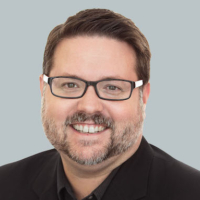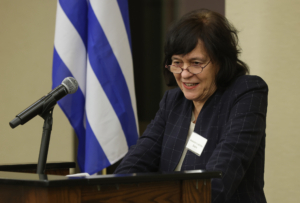The one-year UCLA Luskin MRED is a new kind of real estate program, distinguished by unprecedented collaboration with industry leaders and opportunities for students to apply their academic training to real-world challenges through case studies, site visits and competitions. Mentoring, internship and networking opportunities will give them further access to innovative thinkers and workplace experiences to enhance their career prospects.
The MRED program’s cutting-edge curriculum integrates academic and experiential learning to equip students with both the analytical and practical skills to succeed in a range of careers and a big-picture understanding of the real estate industry’s power to create meaningful community impact.
UCLA has appointed Greg Morrow, a real estate professional and educator who founded UC Berkeley’s MRED+Design program, to lead the new UCLA program. Morrow earned master’s degrees in city planning and architecture from MIT and a doctorate in urban planning from UCLA.

Greg Morrow
“I’m thrilled to be back in L.A. to launch an MRED program that is unlike any other in content, outlook and emphasis on real estate’s central role in shaping society,” Morrow said. “Working with our industry partners, we aim to cultivate future leaders who have superb professional skills and a deep understanding of socioeconomic and policy issues in order to create more livable, resilient, equitable communities.”
MRED students will study under and work alongside accomplished professionals, including developers, lenders, private equity investors, real estate and land use lawyers, affordable housing officials, policy leaders, architects, builders, construction executives, planners and innovators in sustainability. These industry experts helped design the curriculum and will teach most of the classes.
“We’re teaming up with UCLA’s faculty to ensure that students gain the essential skills to succeed in whichever real estate field they choose,” said Alex Rose, executive vice president for development at Continental Development Corp. and a member of UCLA Luskin’s board of advisors. “From day one, graduates of the UCLA Luskin MRED program will have the tools to contribute not just to their employers but to make a difference in their communities as well.”
The interdisciplinary program is housed in the Luskin School of Public Affairs’ urban planning department and will include courses in the Anderson School of Management, UCLA Law and other departments across the university. Students will also have access to broad real estate expertise at UCLA through the Ziman Center for Real Estate, Lewis Center for Regional Policy Studies and the innovative cityLab research center in the department of architecture and urban design.
The new program reflects the University of California’s effort to establish educational paths that address specific workforce needs. In addition to nuts-and-bolts real estate competencies, MRED students will be exposed to the latest trends in real estate — from AI and new design paradigms to advanced construction techniques and financing tools. The program will also address key issues of affordability, equity, sustainability and how development interacts with larger urban development systems.
The curriculum is designed to develop students’ critical thinking, teamwork, communication and problem-solving skills, which are also essential for success in the workplace.
“Los Angeles is an ideal city in which to study real estate,” said Cecilia Estolano, a member of the Luskin board of advisors and a leading expert on contemporary urban planning issues with experience in economic and workforce development, land use, environmental equity and urban revitalization. “We have a diverse economy, dynamic neighborhoods and a range of real estate problems requiring bold, innovative, systemic solutions. UCLA’s MRED will challenge students to situate real estate development in a broader policy context.”
A cultural trendsetter that welcomes reinvention, Los Angeles is undergoing an ambitious urban transformation, including major housing and transit initiatives, as it prepares to host the 2026 World Cup, the 2027 Super Bowl and the 2028 Summer Olympics.
“Los Angeles has proven to be a laboratory marked by innovations that become models for the nation,” said Andy Cohen, co-chair of the Gensler design and architecture firm. “UCLA is at the heart of this global metropolis, giving students in this important new program front-line access to learn from the best so they can shape the real estate industry and build a better future for our cities — locally and internationally.”
“Luskin is a powerful platform that seeks to educate and challenge change-makers to tackle pressing societal issues,” said Anastasia Loukaitou-Sideris, interim dean of UCLA Luskin. “The new master in real estate program is a perfect fit for Luskin. We can’t wait to welcome our first class next year.”
The program is designed for applicants from diverse fields, within and outside real estate, and backgrounds.
“UCLA is a global brand that attracts leading scholars, students and industry partners and has a devoted international alumni network,” Morrow said. “By leveraging the best of UCLA and its alumni, the UCLA Luskin MRED program will build a global brand in real estate. Our graduates will not only change the industry but also change the face of real estate.”


